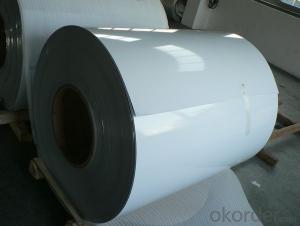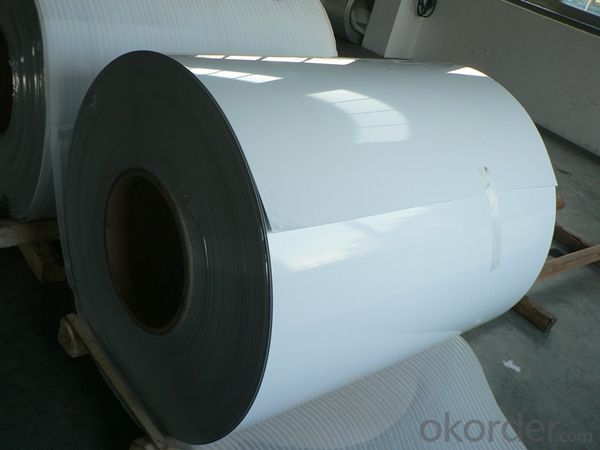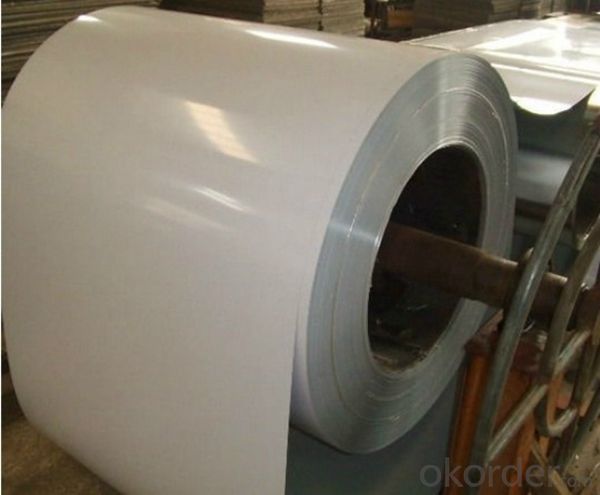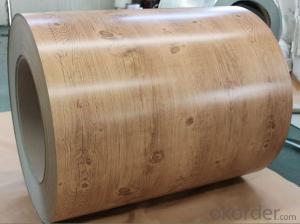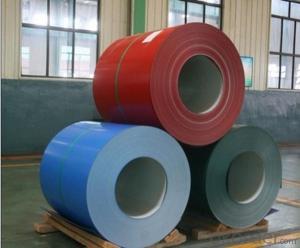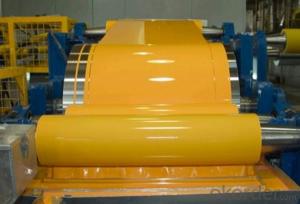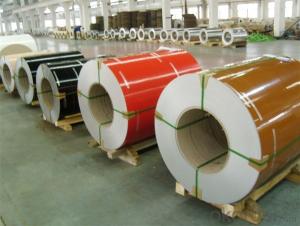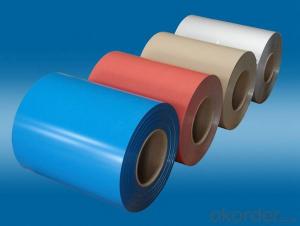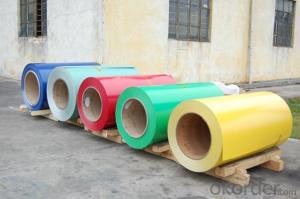Coil Coated Aluminum - White Coating Aluminum Coil for Outdoor Wall System
- Loading Port:
- Shanghai
- Payment Terms:
- TT OR LC
- Min Order Qty:
- 5 m.t.
- Supply Capability:
- 10000 m.t./month
OKorder Service Pledge
OKorder Financial Service
You Might Also Like
Specification
1. Specification of White Coating Aluminum Coil for Out Door Wall System
characteristics | Application |
1) Super peeling strength | 1) Building exterior curtain walls |
2) Excellent surface flatness and smoothness | 2) Decoration and renovation additions for old buildings |
3) Superior weather, corrosion, pollutant resistance | 3) Decoration of interior walls, ceilings, bathrooms, kitchens and balconies |
4) Even coating, various colors | 4) Shop door decorations |
5) Fireproof, excellent heat and sound insulation | 5) Advertisement board display platforms and signboards |
6) Superior impact resistance | 6) Wallboards and ceilings for tunnels |
7) Lightweight and easy to process | 7) Industrial materials, materials for vehicles and boats |
2. Application of White Coating Aluminum Coil for Out Door Wall System
(1).Interior: wall cladding, ceilings, bathrooms, kitchens and balconies, shutters, doors...
(2).Exterior: wall cladding, facades, roofing, canopies, tunnels,column covers , renovations...
(3).Advertisement: display platforms, signboards, fascia, shop fronts...
3. Feature of White Coating Aluminum Coil for Out Door Wall System
*Such coil is specially designed to replace aluminum ingot, due to the high export tax of aluminum ingot, the coil has better price than ingot.
*This type of coil can fit customer's remelting furnace just like ingot, no need to make any change to the production line that was previously used for ingot. The standard coil size and weight is very suitable for the feed gate of furnace.
*This type of coil causes less material wastage than ingot when remelted.
*Our coil is made directly from ore, no need to go though the ingot making process, quality is much better than other suppliers who use ingot scrap to make coil.
Be free from Oil Stain, Dent, Inclusion, Scratches, Stain, Oxide Dicoloration, Breaks, Corrosion, Roll Marks, Dirt Streaks and other defect which will interfere with use
4. Certificate:
SGS and ROHS(if client request, paid by client), MTC(plant provided), Certificate of Origin(FORM A, FORM E, CO), Bureau Veritas and SGS (if client request, paid by client), CIQS certificate
5. Image of White Coating Aluminum Coil for Out Door Wall System
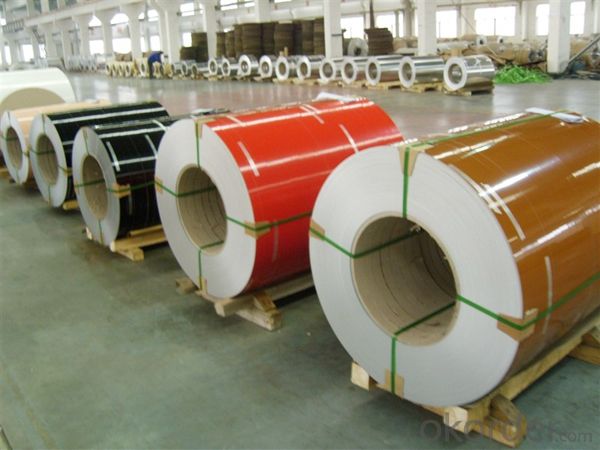
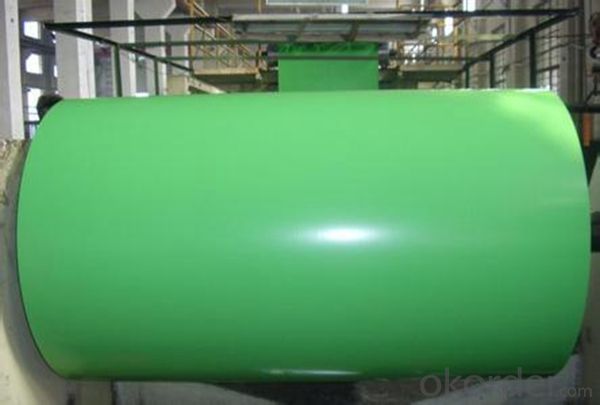
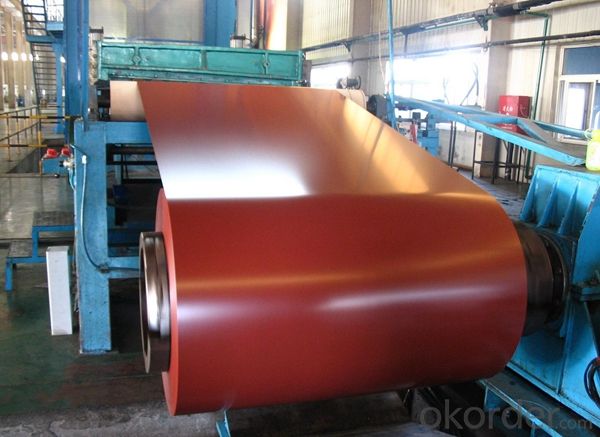
6. Package and shipping of White Coating Aluminum Coil for Out Door Wall System
eye to wall
eye to the wall
with wood pallet (wooded case also available)
7. FAQ
1) What is the delivery time?
Dpends on actual order, around 20 to 35 days
2)What is the QC system:
We have QC staff of 20 persons and advanced equipment, each production is with MTC traced from Aluminum ingot lot.
3) What market do you mainly sell to?
Australia, America, Asia, Middle East, Western Europe, Africa etc
- Q: How to measure the thickness of aluminum coil at real time? In what areas can the sensor be used?
- Displacement sensor can be used in many areas, such as industry.
- Q: my text says aluminium does not corrode much as a passive aluminium oxide layer is formed on it.Well other metals such as sodium adn potassium also form oxides. Why dont their oxides prevent further oxidation ?
- Not sure. Maybe because Na K are more active than Aluminum.
- Q: How do aluminum coils contribute to energy-efficient appliances?
- Aluminum coils play a key role in enhancing the energy efficiency of appliances. The use of aluminum in coil form allows for efficient heat transfer, which is essential for appliances that require cooling or heating mechanisms. Firstly, aluminum coils have excellent thermal conductivity. This means that they can quickly absorb and dissipate heat, resulting in more efficient cooling or heating processes. This is especially important in appliances such as refrigerators, air conditioners, and heat pumps, where effective heat transfer is crucial for maintaining the desired temperature. Moreover, aluminum coils are lightweight yet durable, making them an ideal choice for energy-efficient appliances. The lightweight nature of aluminum reduces the overall weight of the appliance, which leads to lower energy consumption during transportation and installation. Additionally, the durability of aluminum ensures a longer lifespan for the appliance, reducing the need for frequent maintenance or replacement. Furthermore, aluminum is highly resistant to corrosion, which is a common issue in appliances that involve contact with water or moisture. By using aluminum coils, manufacturers can ensure the longevity and reliability of the appliance, thus contributing to energy efficiency by reducing the need for repairs or replacements. Lastly, aluminum is a highly recyclable material. Using aluminum coils in appliances promotes sustainability and reduces the environmental impact. By choosing energy-efficient appliances that incorporate aluminum coils, consumers can support the circular economy and contribute to a more sustainable future. In conclusion, aluminum coils greatly contribute to the energy efficiency of appliances. Their excellent thermal conductivity, lightweight yet durable nature, corrosion resistance, and recyclability make them an ideal choice for enhancing the performance and sustainability of energy-efficient appliances.
- Q: Related technical standards of aluminium coil
- GB/T 1196-2002 remelting aluminium ingotTechnical specification for dustproof and anti gas of GB/T 17397-1998 aluminium electrolysis productionFixed capacitors for use in GB/T 17208-1998 electronic equipment - Part eighteenth: Blank detail specification - non solid electrolyte sheet type aluminium fixed capacitor level E
- Q: This question asks for a comparison between cold rolling and hot rolling processes, specifically in the context of steel wire production for coilings.
- <p>Cold rolling and hot rolling are two distinct processes used in the manufacturing of steel wires for coilings. Hot rolling is performed at high temperatures, typically above the recrystallization temperature of the steel, which allows the material to be shaped more easily. This process results in a more ductile and less hard steel, which can be beneficial for certain applications. However, hot-rolled steel may have a rougher surface and may require further processing to achieve desired dimensions and surface finish. Cold rolling, on the other hand, is done at room temperature, which imparts a harder and smoother surface to the steel. It is more precise and results in tighter tolerances, making it suitable for applications requiring high strength and precision. Cold-rolled steel also has better surface finish and dimensional accuracy compared to hot-rolled steel. However, cold rolling is more energy-intensive and may not be suitable for very thick materials due to the increased hardness of the steel at room temperature.</p>
- Q: What are the common surface treatments for aluminum coils in the automotive industry?
- In the automotive industry, aluminum coils undergo various surface treatments to enhance their performance and appearance. Some common surface treatments for aluminum coils in the automotive industry include: 1. Anodizing: Anodizing is a popular surface treatment for aluminum coils as it creates a protective oxide layer on the surface. This process involves immersing the coils in an electrolytic solution and passing an electric current through it. Anodizing provides corrosion resistance, improves durability, and allows for the application of dyes or paints. 2. Painting: Aluminum coils can be painted to provide an aesthetically pleasing appearance and protection against environmental factors. The coils are coated with a layer of paint, which can be solvent-based or powder-coated. Painting not only enhances the visual appeal but also adds a layer of protection against scratches and UV radiation. 3. Cladding: Cladding involves bonding a layer of aluminum alloy with different properties onto the surface of the coil. This treatment is commonly used to improve the strength, thermal conductivity, or corrosion resistance of the aluminum coil. Cladding can be done through various methods, such as hot rolling, cold rolling, or explosive bonding. 4. Clear Coating: Clear coating is often applied to aluminum coils to provide a transparent protective layer. This coating helps prevent corrosion, oxidation, and discoloration, while also preserving the natural metallic appearance of the aluminum coil. 5. Polishing and Buffing: Polishing and buffing are surface treatments that aim to enhance the surface smoothness and shine of aluminum coils. These treatments involve mechanically grinding or polishing the surface to remove imperfections, scratches, and oxidation. Polishing and buffing are commonly used for decorative purposes in high-end automotive applications. These are just a few of the common surface treatments for aluminum coils in the automotive industry. The choice of treatment depends on factors such as the desired appearance, performance requirements, and environmental conditions the coils will be exposed to.
- Q: How are aluminum coils used in the production of architectural panels?
- Aluminum coils are used in the production of architectural panels as they serve as the primary material for manufacturing these panels. The coils are processed through various techniques such as cutting, bending, and shaping to create the desired shape and dimensions for the architectural panels. These panels are then used for cladding, roofing, or wall systems in buildings, providing aesthetic appeal, weather protection, and structural integrity.
- Q: Explain the distinctions between cold rolled aluminum coils and hot rolled aluminum coils, focusing on the manufacturing process and resulting properties.
- <p>Cold rolled aluminum coils are produced by rolling aluminum at room temperature, resulting in a smoother surface and tighter dimensional tolerances. They have higher strength and hardness due to cold working. Hot rolled aluminum coils, on the other hand, are rolled at high temperatures, which allows for larger thickness reductions and creates a rougher surface. Hot rolled coils are generally softer and more ductile, with lower strength and hardness compared to cold rolled coils. The choice between the two depends on the specific application requirements for strength, surface finish, and formability.</p>
- Q: How are aluminum coils processed for specific thicknesses?
- Aluminum coils are processed for specific thicknesses through a combination of cold rolling and annealing processes. Initially, the coils go through a series of cold rolling mills that gradually reduce their thickness and improve their surface quality. This is achieved by passing the coils through a set of rollers that exert pressure and compress the aluminum, resulting in a thinner and more uniform sheet. After cold rolling, the coils undergo an annealing process, where they are heated and then slowly cooled to enhance their mechanical properties and eliminate any residual stresses. This combination of cold rolling and annealing allows for precise control over the thickness of the aluminum coils, catering to the specific requirements of various industries.
- Q: How do aluminum coils compare to steel coils?
- The characteristics of aluminum coils and steel coils distinguish them in terms of strength, weight, corrosion resistance, and cost. Strength-wise, steel coils generally exhibit a higher tensile strength compared to aluminum coils. This means that steel coils can endure greater stress and pressure without deforming or fracturing. Nonetheless, aluminum coils retain sufficient strength for various applications and can be reinforced or designed for specific purposes. Weight plays a significant role in the comparison between aluminum and steel coils. Aluminum is a lightweight metal, weighing approximately one-third of steel. This lightweight property grants aluminum coils an advantage in applications where reducing weight is crucial, such as in transportation industries or aerospace. Regarding corrosion resistance, aluminum coils surpass steel coils. Aluminum naturally develops a protective oxide layer that prevents further corrosion. Conversely, steel is prone to rust and necessitates additional coating or treatment to enhance its corrosion resistance. This makes aluminum coils the preferred choice in coastal or humid environments where corrosion poses a significant concern. Cost is another vital factor to consider. Aluminum coils often entail a higher initial cost than steel coils due to the elevated cost of raw materials and manufacturing processes. Nevertheless, the overall cost may fluctuate depending on variables like transportation, maintenance, and lifespan. Aluminum coils tend to have lower maintenance costs and longer lifespans due to their corrosion resistance, which can offset the initial investment in the long run. In conclusion, aluminum coils provide several advantages over steel coils, such as lower weight, superior corrosion resistance, and potential long-term cost savings. However, steel coils still boast higher tensile strength and may be the preferred choice in applications that require maximum strength or have a restricted budget. Ultimately, the selection between aluminum and steel coils hinges on the specific requirements and considerations of the intended application.
Send your message to us
Coil Coated Aluminum - White Coating Aluminum Coil for Outdoor Wall System
- Loading Port:
- Shanghai
- Payment Terms:
- TT OR LC
- Min Order Qty:
- 5 m.t.
- Supply Capability:
- 10000 m.t./month
OKorder Service Pledge
OKorder Financial Service
Similar products
Hot products
Hot Searches
Related keywords
